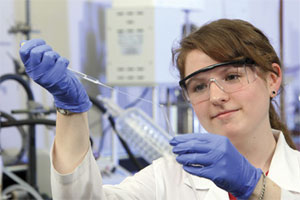 |
| Chemistry student Lauren Longobardi. (Nick Pearce Photo) |
Third-year science student Lauren Longobardi could have spent the summer working near her Fall River home.
Instead, the 20-year-old put her talents as an honours chemistry student to good use in the lab, part of a research team whose work will ultimately help combat breast cancer.
“It’s the best summer job you could ever ask for,” says Ms. Longobardi.
“In class, labs are designed so everything works. The procedures are all set out,” she notes. “Research is very different – it’s more about independent thought, and you have to work through the problems that arise.”
She was one of more than 70 undergraduate students employed in science labs at Dalhousie this summer, funded mainly by the Natural Sciences and Engineering Research Council (NSERC) of Canada and other grants.
“It’s one of the best experiences I’ve ever had,” she says, enthusiastically. “I think the more students that can get this experience, the better.”
More students will get that chance, thanks to the new Faye Sobey Student Undergraduate Research Endowment. The $1-million endowment from the David and Faye Sobey Foundation will fund up to 10 additional research positions for undergraduate science students each summer, in perpetuity.
Applicants must have completed 30 credit hours of course work and have a 3.0 grade point average, as well as a research supervisor willing to provide additional funding, as is the case with many other grants.
The grants will likely total about $5,000 per student, and be available in disciplines across the Faculty of Science. The undergraduate committee will determine award recipients, possibly beginning in 2010.
When Faye (Naugle) Sobey graduated from Dalhousie in 1953 with a major in biochemistry, she was one of only 55 science students – only 14 of them female.
She made a daily trek from her Woodside home, taking a bus, the harbour ferry, and a trolley car to the campus, where she met her future husband.
She also spent a summer working in a university research lab, an experience she found exhilarating and crucial to a well-rounded education.
“It is my hope that by creating a new research endowment, many more deserving students are afforded the same opportunity that I was so fortunate to have received,” she said during a recent luncheon organized to celebrate her gift.
“I wish Dalhousie University continued success building on its legacy as a leading research university and, above all, inspiring generations of students to come.”
These days, Chris Moore, dean of the Faculty of Science, oversees approximately 3,000 undergraduate students – and the male-female ratio is practically even.
But the importance of finding undergraduate research opportunities for those students hasn’t changed.
“There’s absolutely no substitute for it. It inspires students to go into research and make it their career,” he says, describing the new endowment as “fantastic.”
A developmental psychologist, Dr. Moore has supervised undergraduate researchers
many times.
“Faculty members, in general, love to be able to work with new, young, relatively raw but passionate minds,” he says. “All good research involves a team of people. Very little research, particularly in science, is done by one individual. And it’s the team, with the slightly differing perspectives they bring, that provides the creative spark.”
In Ms. Longobardi’s case, one of the focal points of her summer research involved modifying the properties in a particular molecule to make them easier to purify – work that will continue to reverberate in the field of breast-cancer chemotherapeutics.
“Oftentimes, the material we teach in classes is the fundamental aspects of the science. We don’t necessarily get the chance to discuss the applications in the real world – the real world in this case being the research world,” says chemistry professor Alison Thompson.
“Enabling students to get into the lab in the summer gives them a chance to see it in action. Within the short time frame there’s not a chance for someone to invent something that’s going to change the world. It’s part of a bigger project, but the experience is vital.”
Equally important, says Dr. Thompson, is the confidence these students develop. They also boost productivity while adding invaluably to their resumes, she says.
Since arriving at Dal in 2001, she has supervised nine undergraduate students, including Ms. Longobardi, in their summer research.
Considering the intense competition amongst undergrads to nab a summer research post, the significance of the new Faye Sobey Student Undergraduate Research Endowment isn’t lost on Ms. Longobardi.
“She’s giving many more students the chance of a lifetime. What a terrific thing to do,” she says.
